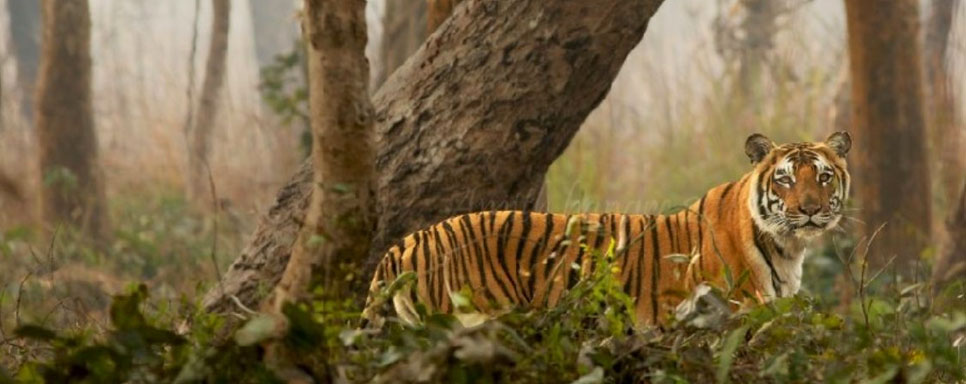Understanding Permissions and Prohibitions at Dudhwa National Park

Dudhwa National Park, a gem in the heart of Uttar Pradesh, India, is a haven for wildlife enthusiasts and nature lovers. As you plan your visit to this biodiversity hotspot, it's essential to be aware of the permissions required and the regulations in place to ensure a harmonious coexistence with the natural surroundings. Here's a comprehensive guide to understanding the permissions and prohibitions at Dudhwa National Park.
Permissions for Entry:
1. Permit for Safari: To explore the rich flora and fauna of Dudhwa, visitors are required to obtain a permit for safari. The park offers both jeep safaris and elephant safaris, each providing a unique perspective on the wilderness. Permits can be obtained at the designated entry gates or through online bookings, and it's advisable to secure them in advance, especially during peak tourist seasons.
The first safari sets the tone for an immersive experience. Dudhwa is renowned for its diverse fauna, including the elusive Bengal tigers, one-horned rhinoceros, spotted deer, and a myriad of bird species. The anticipation builds as the safari vehicle winds its way through the dense foliage, unveiling the secrets of the jungle. The golden hues of the setting sun paint a magical canvas, creating a surreal backdrop for the evening.
2. Accommodation Permits: Dudhwa National Park offers various accommodations, including forest lodges and resorts within the park premises. Visitors intending to stay overnight must obtain accommodation permits. These permits can usually be acquired along with the safari permits, ensuring a seamless experience throughout your stay.
3. Special Permits for Researchers: Researchers and wildlife enthusiasts looking to conduct scientific studies within the park need to obtain special permits. These permits are granted by the forest authorities after a thorough review of the research proposal. It's essential to contact the relevant authorities well in advance and provide detailed information about the research objectives and methodologies.
Prohibitions for Conservation:
1. No Unauthorized Entry: Dudhwa National Park is a protected area, and unauthorized entry is strictly prohibited. Visitors must adhere to designated entry points and specific routes during safaris to minimize disturbance to the wildlife. Straying from these routes can have severe consequences, both for the visitors and the delicate ecosystem.
2. No Littering and Pollution: Maintaining the pristine environment of Dudhwa is a collective responsibility. Visitors are strictly prohibited from littering, and the use of plastic within the park is banned. It is crucial to respect the natural beauty of the park by not leaving any waste behind and ensuring that any materials brought into the park are properly disposed of.
3. No Disturbing Wildlife: Dudhwa is home to a diverse range of wildlife, including endangered species such as the Indian rhinoceros. Disturbing or provoking wildlife is strictly prohibited. Visitors must maintain a safe distance from animals, refrain from making loud noises, and avoid actions that may stress or agitate the inhabitants of the park.
4. No Open Fires: Lighting open fires within the park is strictly prohibited due to the risk of wildfires. Visitors are urged to follow fire safety guidelines and use designated areas for cooking if permitted. This measure helps protect the park's vegetation and prevent accidental fires that could have devastating effects on the ecosystem.
5. No Feeding Wildlife: Feeding wildlife is prohibited to maintain the natural behavior and diet of the animals. Human food can be harmful to wildlife, and animals that become accustomed to human food may lose their ability to forage for natural sources, impacting their health and survival.
6. No Unauthorized Camping: While camping is allowed in designated areas with proper permits, unauthorized camping is strictly prohibited. Visitors must adhere to the guidelines set by the park authorities, ensuring a minimal impact on the environment and wildlife.
Guidelines for Responsible Tourism:
1. Follow the Code of Conduct: Visitors should familiarize themselves with the park's code of conduct and adhere to guidelines set by the forest authorities. Responsible behavior ensures a positive and sustainable tourism experience.
2. Educational Programs: Engage in educational programs organized by the park authorities to enhance your understanding of Dudhwa's ecosystem. Learning about the flora, fauna, and conservation efforts adds depth to your visit and promotes a sense of responsibility towards nature.
3. Support Conservation Initiatives: Contribute to conservation efforts by supporting local initiatives and organizations working towards the protection of Dudhwa National Park. Responsible tourism involves leaving a positive impact on the environment and local communities.
Conclusion
Dudhwa National Park offers a unique opportunity to connect with nature and witness the beauty of a diverse ecosystem. By understanding and respecting the permissions and prohibitions in place, visitors can ensure a meaningful and sustainable experience while contributing to the conservation of this precious wilderness. As you embark on your journey to Dudhwa, let the spirit of responsible tourism guide your footsteps, allowing you to appreciate and preserve the natural wonders of this exceptional national park.